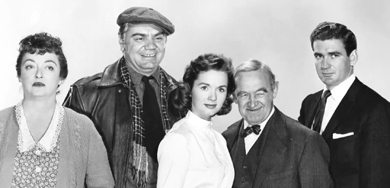The Catered Affair (1956)
Rod Taylor plays Ralph Halloran -- a sensible, bespectacled schoolteacher --
in this low-key family drama with high-caliber talent on and off screen.
"The Catered Affair" was directed by Richard Brooks and produced
by Sam Zimbalist. The cast was led by Bette Davis, Ernest Borgnine,
Debbie Reynolds and Barry Fitzgerald. Gore Vidal did the screenplay,
adapting a television play by Paddy Chayefsky.
Rod Taylor earned his role in this ensemble based on the strength of a screen test for the Rocky Graziano story, "Somebody Up There Likes Me." Although Paul Newman
got that part, Taylor landed a contract with MGM, and the accent he put
on for the screen test earned him the role as a schoolteacher from the Bronx in "The
Catered Affair."
His accent was so convincing, Rod said that the new MGM chief, Dore Schary,
"didn't know I was just 18 months out of Australia until the movie was half
finished."
"The Catered Affair" is a kitchen-sink drama, depicting the lives
of working class families. The movie followed quickly on the success
and acclaim of "Marty" (1955), which had been written by Chayefsky
and won Oscars for best picture and best actor (Borgnine).
The acclaim for "The Catered Affair" was not on a par with
"Marty," but it did earn Debbie Reynolds a best supporting actress
award from National Board of Review.

THE STORY
As the film opens, Jane Hurley (Debbie Reynolds) announces at breakfast
that, after three years of courtship, she and her fiancÚ Ralph are getting married
in a week. She says they just want a small wedding with the immediate family and
no reception. Jane's parents react matter-of-factly and everyone seems to
be in agreement about the practicality of the arrangement.
But when the future in-laws gather for dinner that evening, all Ralph's
parents talk about are the big weddings they gave their daughters. All of a
sudden, Jane's mother (Bette Davis) is planning a big wedding breakfast with
hundreds of guests.
As the cost of the catered affair begins to exceed the family's savings,
Mrs. Hurley rails at Mr. Hurley (Ernest Borgnine) for failing to be a good
provider. But Mr. Hurley has been saving money to buy his own taxicab, and
on the verge of realizing that dream, he sees all his money going toward
a wedding neither Jane nor Ralph really want.
The wedding is clearly compensation for Mrs. Hurley's own hurried, unromantic
nuptials as well as her general emotional disregard for her daughter as
she grew up. It's her chance to give her daughter something to think of
"when the bad years come."
As a counterpoint to the indifference and awkwardness in the Hurley household,
it's clear that Jane and Ralph won't have any bad years. In one scene together,
Taylor and Reynolds show us a couple comfortable with each other and with a sweet passion that's sure to endure.
DEBBIE AND THE DIRECTOR
Richard Brooks, the director of "The Catered Affair," had praise for young Rod Taylor:
He acts the way he is. His principal asset, as an actor
and a person, is the fact that he listens well to a director and other
players. His actions are all normal to the scene and honest, particularly
in a role which will permit him to exploit his own personality. I predict
that Rod Taylor will go straight to the top.
But Brooks wasn't always so kind.
"I didn't know it at the time, but Brooks ate and digested actors
for breakfast," Ernest Borgnine is quoted as saying in "Tough as Nails: The
Life and Films of Richard Brooks" by Douglass K. Daniels. "If things
weren't working, he let you know it, and not gently."
Case in point was Debbie Reynolds. Like Bette Davis, she played
against type in "The Catered Affair." Unlike Davis, she did not have
a long history of dramatic roles to give her credibility with her
director.
In her autobiography, "My Life," Reynolds said she felt like she was
right for the role -- she could relate to the hardscrabble youth of
her character. The studio wanted her for the role. But Brooks
protested. He wanted someone very understated, not known, and not so
cute.
"He called me Miss Hollywood and Debbie Darling and Debbie Dimples,"
Reynolds wrote. "Maybe he thought I was going to play star."
Reynolds describes how her costars helped her through scenes when
Brooks was being cruel to her. She did give Brooks his due, however. "When it came to
actual shooting, the director worked hard with me too," she wrote. "But he
intimidated me throughout the production and I hated it."
Shortly after Rod's death, Reynolds repeated her sentiments in her
Dear Debbie column in Globe magazine, Feb. 2, 2015:
-
A handsome leading man and marvelous actor ... but I knew him as a
terrific friend. Rod and I met in the early 1950s when we worked
together on The Catered Affair. Making this movie was very difficult
for me because the director, Richard Brooks, treated me like a child
and made my life miserable. Because of the director's behavior,
Bette Davis, Ernest Borgnine and Rod, who played my fiancÚ, all took
care of me. They helped me with my scenes and treated me so well. I
will never forget Rod's kindness as he and the others turned a
difficult experience into a marvelous one. Rod and I spent many good
years together while we were under contract at MGM.
The affection and respect was mutual. Rod said in an interview in
Modern Screen magazine, July 1965:
-
Debbie I adore... so much so that I by-passed Julie Andrews and
voted for Debbie in the best-actress Oscar race this year. I still
think she should have won it for "The Unsinkable Molly Brown."
|